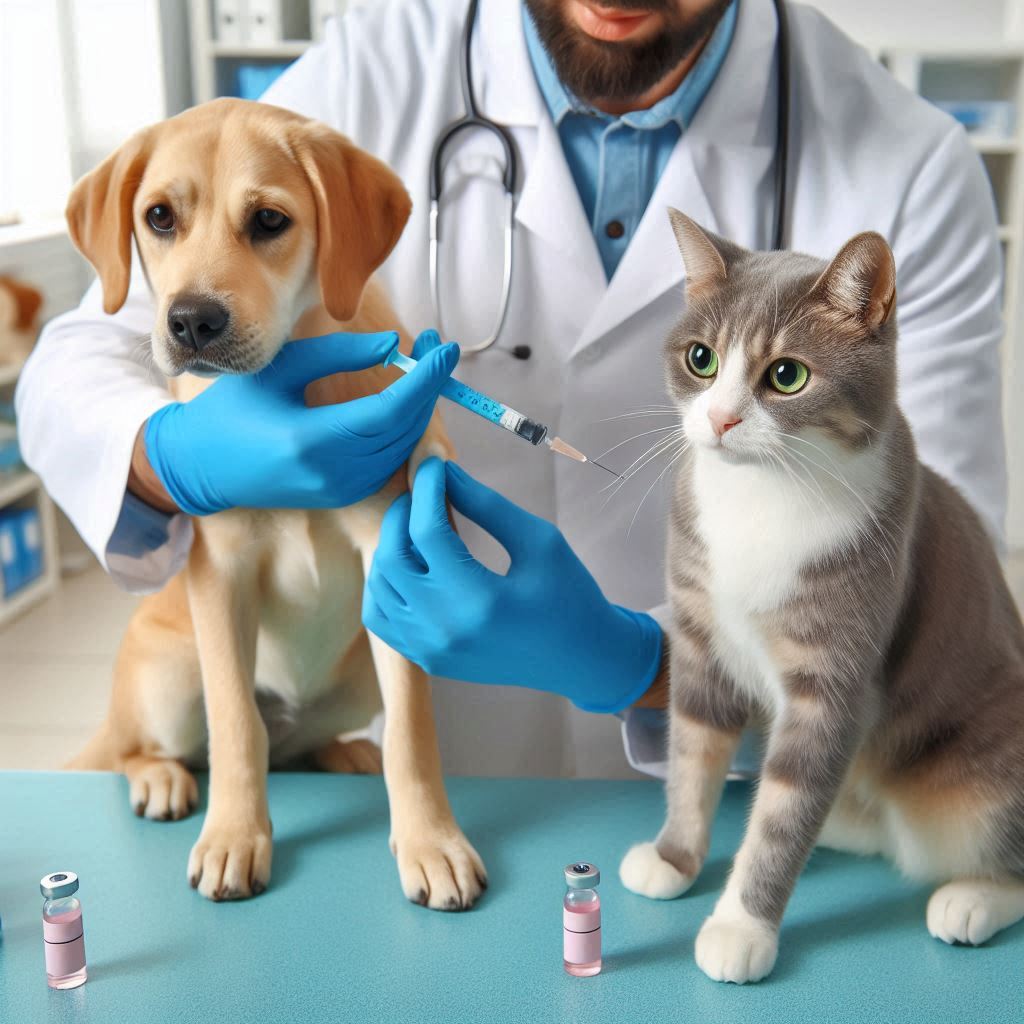A Complete Guide to Protecting Your Pet’s Health

Vaccines are like a suit of armor for your pets, protecting them from some pretty nasty diseases that are seriously contagious. Ever heard about parvovirus or feline distemper? Yep, these are the kinds of things that vaccines help fend off. It’s not just about your pet either—keeping up with vaccinations plays a big role in keeping all our fluffy buddies safe from outbreaks.
Pet vaccinations help ensure diseases don’t spread like wildfire. Think of them as a community service; it’s about keeping the whole neighborhood safe and sound. Even if your pet seems like a lone ranger, interactions happen more than you realize, whether it’s at the park, the vet, or even if they accidentally meet a wandering stray.
There’s some funky misinformation floating around about vaccines. A lot of folks get concerned about potential side effects or have heard rumors that just aren’t true. But most side effects are super mild, like a bit of soreness or a slight fever. We’re talking about a few hours of feeling under the weather. The benefits of vaccinating far outweigh these minor inconveniences.
Some people think a single vaccine does the trick for life, like some sort of magical one-time deal. In reality, regular booster shots are essential to keep that immunity strong. Vaccines adapt as new strains and diseases pop up, so staying updated is vital. It’s like updating your pet’s invisible shield to the latest version.
Core Vaccines Every Pet Requires
Understanding Essential Vaccines for Long-Term Pet Health
Core vaccines are like the must-have essentials in your pet’s health toolkit. These vaccines target the big, bad diseases that are widespread and super dangerous. When it comes to both dogs and cats, certain vaccines top the list—think distemper, parvovirus for dogs, and feline herpesvirus for cats.
 For our dog pals, core vaccines include those for rabies, distemper, parainfluenza, adenovirus, and parvovirus. These are essential because they protect against viruses that are not only prevalent but can also be life-threatening. Rabies, for example, is a biggie—it’s a disease that affects not just pets but can spread to humans too.
For our dog pals, core vaccines include those for rabies, distemper, parainfluenza, adenovirus, and parvovirus. These are essential because they protect against viruses that are not only prevalent but can also be life-threatening. Rabies, for example, is a biggie—it’s a disease that affects not just pets but can spread to humans too.- On the feline side of things, rabies, feline herpesvirus, calicivirus, and panleukopenia

- vaccines are crucial. Panleukopenia is often referred to as feline distemper, and it wreaks havoc on a cat’s body if they’re not protected. Without these vaccines, cats are susceptible to diseases that can spread rapidly, especially in multi-cat environments like shelters.
- Timing is everything when it comes to vaccinations. Puppies and kittens are especially vulnerable as they wean off their mother’s immunity, so a scheduled series of shots is key. Typically, this starts at six to eight weeks of age, with boosters following every few weeks until they’re about six months old. After that, regular annual vaccinations help maintain their protection.
It’s totally normal for your pet to feel a bit off after a shot. Expect a bit of drowsiness or minor swelling at the injection site. If something feels off, trust your gut and chat with your vet. They’re there to make sure your fur baby is safe, and sound and they can offer guidance specific to your pet’s needs.
Optional Vaccines Based on Lifestyle and Risk
Customizing Preventative Care to Match Your Pet’s Lifestyle
Non-core vaccines are kinda like those optional toppings you get offered when ordering a pizza. They aren’t for everyone, but depending on your pet’s lifestyle, they can be super important. Not every pet interacts with the same environment of other animals, so this is where you evaluate your pet’s daily adventures—whether they’re spending lots of time in nature or hanging with other pets.
- Say your dog is a frequent hiker or a boarding kennel regular. Then Leptospirosis and Bordetella vaccines might be on your radar. Outdoor-loving dogs are at a higher risk for Leptospirosis, which is spread through water contaminated by wild animals. Bordetella, on the other hand, is highly contagious and is often required if your dog visits groomers, doggy daycare, or kennels.
- Cats that roam outdoors may need the feline leukemia vaccine. It’s a big concern for cats that encounter other neighborhood felines. If your kitty is more of a house cat with no outdoor ambitions, your vet might suggest skipping this one.
- Your vet is like your pet’s health guru, so working with them is a smart move when tailoring a vaccination plan. They help match vaccines to your pet’s lifestyle and the risks they face. Be open about your pet’s habits and environments. This conversation can save you unnecessary costs and, more importantly, keep your pet safe from unseen threats.
Always weigh the benefits and risks of these additional vaccines. While some might seem like overkill, they can be lifesavers for pets in certain living situations. If you ever feel unsure, a discussion with your vet can bring clarity so you can make informed decisions.
Staying Informed and Being a Responsible Pet Owner
Making Smart Decisions to Ensure Your Pet’s Health and Happiness
Keeping a detailed vaccination record for your pet is an excellent way to stay organized. It helps track when the next booster is due and makes life a lot easier during vet visits or emergencies.
- Booster shots aren’t just another vet visit to tick off your list—they’re vital for maintaining the immunity your pet gets from initial vaccinations. Think of boosters as renewing the protection coverage you want your furry friend to have.
- While vaccination standards remain fairly stable, guidelines can shift as more research becomes available. Staying updated with these changes is part of keeping your pet healthy. Your vet will inform you of any new or adjusted vaccine needs during your regular check-ins.
Vaccinations are a huge part of responsible pet ownership, but they aren’t the only part. Consistent exercise, a balanced diet, regular vet visits, and plenty of love go a long way in ensuring your pet leads a long, happy, and healthy life.
If you have any questions, personal experiences or tips to share, I’d love your feedback. Please make comments below. Thanks for joining me on this journey regarding vaccines every pet needs.
- Janice

 For our dog pals, core vaccines include those for rabies, distemper, parainfluenza, adenovirus, and parvovirus. These are essential because they protect against viruses that are not only prevalent but can also be life-threatening. Rabies, for example, is a biggie—it’s a disease that affects not just pets but can spread to humans too.
For our dog pals, core vaccines include those for rabies, distemper, parainfluenza, adenovirus, and parvovirus. These are essential because they protect against viruses that are not only prevalent but can also be life-threatening. Rabies, for example, is a biggie—it’s a disease that affects not just pets but can spread to humans too.
This was such a great read! I didn’t realize how much vaccinations do for not just pets but the whole community. Quick question—what would you recommend for someone adopting an older pet who might not have a clear vaccination history? Also, for things like Bordetella or feline leukemia, are there any signs pet owners should watch out for if their pet hasn’t been vaccinated?
Just curious!
Thanks for sharing such helpful info!
Thank you for your comment about pet vaccines. Yes, the pets need vaccinations, as you stated, to help the pet as well as the whole community.
Bless you for adopting a senior pet. The most important thing for you to do is take your beloved pet to a veterinarian and tell them the fur babies story as far as you might know it, so the pet can get a full exam to make sure there are no health issues that you would need to be made aware of.
Bordetella is a highly contagious infection of the respiratory tract, that develops in 3 distinct stages. A dose of Bordetella medicine is squirted up into the nose of the pet. Any boarding type facilities require your pet to have the Bordetella vaccine before they can take them and put them in with other pets in their care, who have also received the Bordetella dosage.
Feline leukemia virus is one of the most important infectious diseases of cats worldwide. Affected cats can develop anemia (a low red blood cell level), cancers, and/or suppression of the immune system. The disease worsens over time and is usually fatal. The virus can infect domestic and wild cats. This is why the vet world like to keep up with the vaccinations for this. If your cat is indoors 24 hours a day/7 days a week, the vaccine is not quite so necessary, as long as your vet agrees to it.
I hope I sufficiently answered your questions. I appreciate your concern for pets. We as humans are all they have to take care of them and to look after them. They will give you all the love they have.
I’m glad the info I shared was helpful to you. Give your fur babies a hug from me.